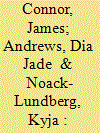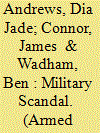| Srl | Item |
| 1 |
ID:
178351


|
|
|
|
|
| Summary/Abstract |
Loyalty between soldiers is idealized as an emotion that promotes cohesion and combat effectiveness. However, little empirical work has examined how military personnel understand, feel, and enact loyalty. We use a symbolic interactionalist informed frame to explore the lived experience of 24 retired Australian Defence Force members via in-depth semi-structured interviews. Our analysis revealed three core themes: (1) Loyalty as reciprocity, where there was an expectation that loyalty would be returned no matter what. (2) The importance of emotional connection for cohesion. (3) Loyalty as a prioritizing process, where a soldier’s loyalties gave them a way of choosing between competing demands. Loyalty is a moral emotion that enabled sensemaking. Close interpersonal loyalties tended to trump wider/diffused loyalties. Respondents understood their loyalties to fellow soldiers within wider social constructs of mateship and professionalism. The findings show the risks that come from a reliance on loyalty for combat cohesion.
|
|
|
|
|
|
|
|
|
|
|
|
|
|
|
|
| 2 |
ID:
174840


|
|
|
|
|
| Summary/Abstract |
Military scandals are disruptive episodes that can have long-lasting organizational consequences for military institutions. Recently, scholars who study military institutions have sought to understand this phenomenon and its significance. However, given their complexity and empirically opaque nature, military scandals are difficult to study, and a general account of this phenomenon has remained elusive. This article addresses this problem by drawing upon the growing field of scandal research to present a definition and account of the military scandal. We argue that military scandals are episodes of mediatized public moral conflict concerning transgressions involving the military institution, its members, and/or associated actors. We employ Ari Adut’s theory of public attention as a core explanation of scandal dynamics and effects and use this to argue that the military scandal phenomenon can be employed to simultaneously examine interactions and relationships between the military, the state, news media organizations, and civil society.
|
|
|
|
|
|
|
|
|
|
|
|
|
|
|
|